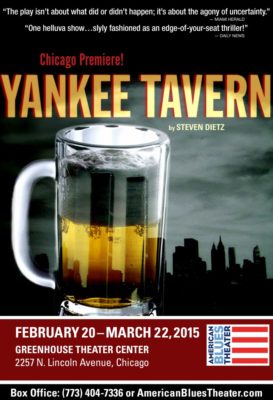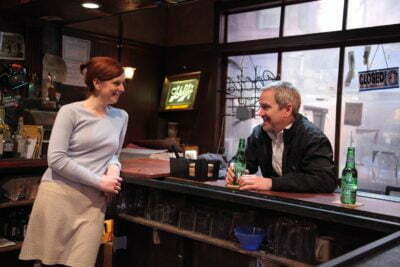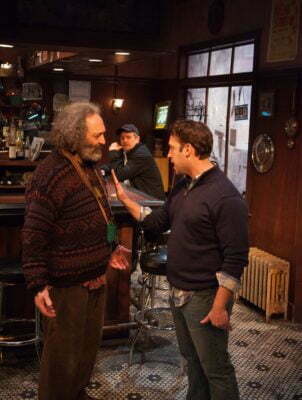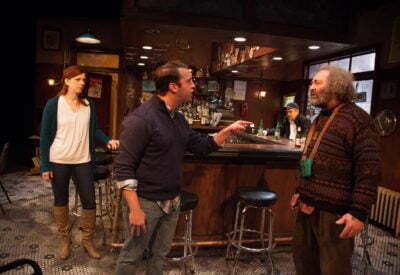Yankee Tavern
By Steven Dietz
Directed by Joanie Schultz
Produced by American Blues Theater
9-11 Conspiracies Fuel Drama
The complexity of conspiracy theories are naturally fascinating to a storyteller. Not that they’re necessarily well-told or sensible stories, but their believers and repeaters grant them an importance many artists wish their own stories could gain. In his 2009 play, Yankee Tavern, now playing at American Blues Theater, Steven Dietz explored the impact come of these conspiracies have on people, while indulging himself in sharing some of his favorites. It’s an interesting production, though the thriller nature of the story, probably by design, leaves the audience forever unsure of what exactly is transpiring.
The titular Yankee Tavern, naturalistically designed by Grant Sabin, is a small blue collar bar attached to an abandoned hotel in New York City. A Jimmy Carter campaign poster still hangs on the wall, even though the play takes place around 2006. Tending the bar is Adam (Ian Paul Custer), who though pursing a master’s degree in international relations, is the son of the tavern’s deceased founder and still feels enough loyalty to keep it running until it is demolished. His fiancé, Janet (Darci Nalepa), is sitting at a table, cooling displaying her outsider status with a Starbucks cup while a pot of coffee brews just over her shoulder. They discuss their upcoming wedding, which Adam has not invited anyone to, when his uncle Ray enters, describing all the evil of corporations from Starbucks to the wedding industry.
Ray, played by Richard Cotovsky, is an old hippie who lives in the crumbling upstairs hotel, communing with ghosts and calling into radio shows to describe conspiracy theories. One of his favorites is that the US landed on a moon, but not Earth’s moon. When talk turns to Adam’s degree, he mentions that Adam had a crush on his Islamic studies teacher, Dr. Andjata, who is now an interpreter for the government. At that point a stranger named Palmer (Steve Key) enters. He’s not very talkative, though he does weird things like ordering a beer for an empty space and indulging Ray when the conversation turns to 9-11. Adam becomes increasingly frustrated, and Janet reveals that his thesis is on the harm caused by conspiracy theories. Ray is naturally offended.
However, things start getting weird for Janet when Adam leaves for Washington D.C. to discuss job opportunities with intelligence agencies he can’t tell her about. Not a huge deal, except he’s being accompanied by Dr. Andjata, and Palmer returns with evidence they are having an affair. He and Janet laugh over some more 9-11 conspiracy theories, but Palmer takes others pretty seriously. And he’s convinced that Dr. Andjata is not to be trusted, and Adam may be deceiving Janet about other things as well.
Each actor is strong, though their characters are often written to be opaque. Richard Cotovsky’s Ray is the most memorable, clad in an old, stained cardigan by costume designer Izumi Inaba. Ray has the most lines, and Cotovsky lost the rhythm of some of them at the press opening, but that’s the kind of thing that improves with each performance. He perfectly captures an old blowhard who tells stories to amuse himself, and doesn’t really treat them with the seriousness they would deserve if true. He clearly cares about Adam and Janet, though, and accepts the story that Adam’s father killed himself, perhaps feeling that’s something too important to make up stories about. Nalepa’s Janet is the most ordinary of the characters, and does her best to navigate tricky terrain despite her impatience. She has an excellent monologue about the confused feelings of being left out of 9-11 mourning due to lack of personal connection. Custer and Key’s characters are the most mysterious. We never really know what Adam and Palmer are up to. Custer plays Adam as a man who is too smart for this environment but trapped in it by emotional problems, while Key plays Steve as an avenger similar to the “stranger” character in old westerns.
The difficulty of this play is that it addresses the problem of living with unknowns by presenting a story in which the audience never fully understands what half the characters’ agenda is or what results from it. Thanks to Joanie Schultz’s directing, that doesn’t come across as lazy writing, but it can still be annoying. An early theme of Ray’s ranting is that he uses cynicism as an excuse for apathy and obedience. Dietz’s story isn’t cynical, but it does present the difficulty of making decisions while plagued with doubts. Schultz’s director’s note encourages the reader to ask more questions of the government, which is never a bad idea, but through Ray the play presents the opposite problem of evading responsibility through despair.
Recommended
Jacob Davis
Reviewed February 26, 2015
For more information, see Yankee Tavern’s page on Theatre in Chicago.
Playing at the Greenhouse Theater Center, 2257 N Lincoln Ave. For tickets, call 773-404-7336 or visit AmericanBluesTheater.com. Tickets are $29-39. Performances are Wednesday-Saturday at 7:30 pm and Sunday at 2:30 pm through March 22, with additional performances on March 14 and 21 at 3:30 pm. Running time is about one hundred minutes with one intermission.



